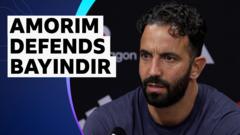Did Amorim Justify Bayindir's Blunder?

Understanding Goalkeeper Mistakes: A Deep Dive into Altay Bayindir's Performance
In the high-stakes world of professional football, mistakes can often become the focal point of intense scrutiny, especially when they directly influence the outcome of a match. Recently, Manchester United's goalkeeper, Altay Bayindir, found himself in the spotlight following a critical error that led to Arsenal's winning goal during a match at Old Trafford. Manager Ruben Amorim came to Bayindir's defense, emphasizing the importance of resilience and learning from such incidents. In this article, we will analyze the implications of goalkeeper errors, the role of a manager in supporting players, and how these factors contribute to a team's overall performance.
The Pressure on Goalkeepers
Goalkeepers are often viewed as the last line of defense, and with this role comes immense pressure. They are tasked with making split-second decisions that can determine the outcome of a game. A single mistake can lead to a goal, shifting the momentum of the match and affecting team morale. This pressure is compounded during high-profile fixtures, such as the one between Manchester United and Arsenal, where every mistake is magnified in the media and among fans.
Analyzing the Mistake
Bayindir's mistake that allowed Arsenal to score was not just a moment of poor judgment; it was a culmination of various factors, including match context, psychological pressure, and perhaps even miscommunication with defenders. Understanding these nuances can help players and coaches alike develop strategies to mitigate such errors in the future. Here's what typically goes wrong during these critical moments:
- Misjudgment of Timing: Goalkeepers must have an acute sense of timing, whether it’s when to come off their line or when to stay put.
- Communication Breakdown: A lack of clear communication with defenders can lead to confusion, resulting in goal-scoring opportunities for the opposition.
- Psychological Factors: Pressure can cloud judgment, leading to rushed decisions that may not align with the game plan.
The Manager's Role in Crisis Management
When a player makes a mistake, the response from the manager can significantly impact their recovery and future performances. Ruben Amorin's defense of Bayindir illustrates the importance of support in these situations. By publicly backing his player, Amorin not only helps Bayindir regain his confidence but also sends a message to the rest of the team that mistakes are a part of the game and can be learned from.
Furthermore, a manager’s role extends beyond immediate support; it involves implementing strategies to help players improve. This could include additional training sessions focused on specific skills, video analysis to identify patterns leading to mistakes, or fostering an environment where players feel safe to express their concerns without fear of judgment.
Learning from Mistakes: A Path to Improvement
For players like Bayindir, every mistake represents an opportunity for growth. Here are a few ways in which goalkeepers can learn and adapt following errors:
- Self-Reflection: Analyzing the mistake to understand what went wrong is crucial. This includes reviewing footage and discussing the incident with coaches.
- Strengthening Fundamentals: Focusing on basic skills such as positioning, decision-making, and shot-stopping can help reduce the likelihood of future errors.
- Psychological Resilience: Building mental toughness through sports psychology techniques can help players manage pressure better during crucial moments.
Beyond the Mistake: Team Dynamics and Confidence
The impact of a goalkeeper's mistake extends beyond the individual player; it can ripple through the entire team. When a goalkeeper falters, defenders may feel less confident, which can lead to more mistakes. Conversely, when a goalkeeper is playing well, it can instill a sense of security in the backline, allowing defenders to play more freely.
Building Team Cohesion
One of the keys to mitigating the effects of mistakes is fostering a strong sense of team cohesion. Here are some strategies that teams can employ:
- Team Meetings: Regularly scheduled meetings where players can discuss their experiences, including mistakes, can help build trust and understanding.
- Group Training Sessions: Organizing group drills that involve both goalkeepers and defenders can enhance communication and teamwork.
- Encouraging a Positive Culture: Creating an environment where players feel comfortable discussing their errors openly can lead to collective improvement.
The Role of Fans and Media
Fans and media often play a pivotal role in shaping a player’s experience after a mistake. In today’s digital age, social media amplifies the scrutiny players face, which can lead to increased pressure. It's essential for players to develop coping strategies to deal with public criticism while focusing on their game.
The Importance of Goalkeeper Training
To minimize the likelihood of errors, clubs must invest in specialized goalkeeper training. This type of training focuses on the unique skills required for the position, such as:
- Shot-Stopping Techniques: Practicing various save techniques to prepare for different types of shots.
- Distribution Skills: Focusing on accurate and effective ball distribution to start counterattacks.
- Positioning Drills: Enhancing spatial awareness to make better decisions during high-pressure situations.
Goalkeeper Psychology
The psychological aspect of goalkeeping cannot be overstated. A goalkeeper must possess mental fortitude to bounce back from mistakes. Techniques such as visualization, mindfulness, and positive self-talk can be instrumental in maintaining focus and composure during matches.
Final Thoughts: Moving Forward After a Setback
Altay Bayindir’s experience serves as a reminder that mistakes are an inherent part of sports, particularly in high-pressure environments like the Premier League. The way a player responds to failure often defines their career trajectory. With the right support from coaches, teammates, and the club, they can transform these setbacks into stepping stones for future success.
As we reflect on Bayindir's performance and Amorin's support, it raises an intriguing question: how do you think a team's culture can influence a player's ability to recover from mistakes? The dynamics within a squad can either make or break a player's confidence. In a world where mental resilience is as crucial as physical skill, the relationship between players and their support systems is more important than ever.
FAQs
What should a goalkeeper do after making a mistake in a game?
A goalkeeper should analyze the mistake, seek feedback from coaches, and focus on improving specific skills while maintaining mental resilience.
How can team dynamics affect a goalkeeper's confidence?
Strong team dynamics can instill confidence, while negative interactions can lead to insecurity in a goalkeeper, affecting their performance.
What role does a manager play in helping a player recover from a mistake?
A manager provides support, guidance, and strategies to help a player learn from their mistakes and regain confidence.
In conclusion, as we navigate the complexities of goalkeeping and team dynamics, it's vital to foster an environment where players can learn from their mistakes without fear. How do you think teams can better support their players in overcoming challenges? #Football #Goalkeeping #TeamSupport
Published: 2025-08-17 21:24:13 | Category: sport



